It's supposed to be the happiest time of the year, but this year it doesn't really feel like it. With many of us hunkered down at home, some having lost jobs, others having lost friends and family members to COVID-19 or other illnesses, it's tempting to give this holiday season a miss.
But it's important to find joy and meaning in the midst of this dark winter — and carrying on with favorite holiday traditions can help. NPR checked in with medical researchers to figure out how risky our favorite customs are, and highlight ways we can all celebrate more safely.
"The holidays are just one more time that we have to reframe what we are doing," says infectious disease specialist Dr. Preeti Malani, chief health officer at the University of Michigan. "What we do today can help us stay healthy so that we can celebrate fully next year and beyond."
1. Holiday shopping
Online shopping and shipping directly to the recipient is the safest because you do not have to leave your home, experts say. It may be too late to have gifts delivered by Dec. 25, but ordering from local shops by phone or online and picking up curbside is still much safer than browsing through stores.
If you must go inside a store, consider the risk, says epidemiologist Mercedes Carnethon, professor of preventive medicine at Northwestern University's Feinberg School of Medicine. Avoid it entirely "if the store is crowded, poorly ventilated or if people aren't complying with mask wearing orders" she says.
If you do go into a store to pick out a gift, minimize the time you spend there. And try to choose a store that's on the smallish side "where you can get in and out a bit easier and quicker," Malani says.
Consider heading outdoors for last-minute deals at craft fairs and farmer's markets, she says — as long as everyone's masked, and it's not too crowded. "It's a nice way to help the local economy and local artists — and get something special."
And finally, maybe this is the year to simply write heartfelt cards. Sometimes it really is the thought that counts, and getting that handwritten card in the cold, bleak days of January can be just as comforting as in December, so don't worry you're too late. Or if you have DIY tendencies, give baked goods or other homemade gifts.
2. Visiting Santa

All our experts agree: Going to the mall, waiting in line and sitting on Santa's lap is just a high-risk, unrealistic activity this year.
The good news is that Santa has "transformed his whole workshop to become virtual," says Malani. Virtual experiences with Santa are available at Macy's Santaland and Mall of America; each has an online tour of the North Pole. Some stores offer reservations for a personalized Zoom visit with Santa.
Some local, independent Santas are getting creative online, too. Take Dreezy Claus, who calls himself "Chicago's Black Santa." Andre Russell says he tries to make the virtual experience just as engaging to let kids know that "Santa has not forgotten about them." He wants kids to know the magic still exists and even Santa is adapting to the pandemic.
Families sign up for an appointment, log in at their designated time, and Santa appears, head to toe, red suit and hat and gray beard and dreadlocks. He reads a children's book he wrote, "Dreezy Claus and the Boy Who Didn't Believe," about a little boy who didn't believe Black Santa existed until he finally meets him.
And other nontraditional Santa visits are popping up, says psychologist Maryam Jernigan-Noesi, including places that let kids drop a note in Santa's bag, instead of sitting on his lap. But again, this is best only if in an outside setting, physically distanced and wearing a mask.
And of course, there's the old fashioned and least risky option: making a list, checking it twice and sending it off to the North Pole! (The U.S. Postal Service offers a service to facilitate a reply.)
3. Parties and celebratory meals
This is a tough one. Shared dinners and parties at Hanukkah, Kwanzaa and Christmas are often the core of traditional celebrations. But this year, any indoor gathering with people outside your household is really not safe, says Dr. Judy Guzman-Cottrill, professor of pediatric infectious diseases and health care epidemiologist at Oregon Health and Science University.
"Indoor spaces have comparatively worse air ventilation than outdoors," and often don't accommodate adequate physical distancing, she says. "When you add eating and drinking, guests must remove their masks — and viral risk dramatically rises." Plus, drinking alcohol makes everyone less vigilant about safety precautions.
Tough as it might be, Guzman-Cottrill urges us all to postpone parties and family gatherings for the next several months. "It's just not worth the risk now, especially when a hospital bed cannot even be guaranteed" if you get seriously sick or in a car accident, she says.
The risk is lower — but still dangerous, now that community levels of coronavirus are so high all across the U.S. — if you keep the gathering small (10 people or less) and include only one or two other non-household family members.
If you must add non-household members to this gathering, have everyone wear masks when not eating, and consider sitting physically distanced, even breaking the small group up into even smaller groups that sit in different parts of the house for the meal. Open windows, when possible, to increase ventilation. And, as always, weather permitting, dining outside is the best option.
Malani says families need to discuss in advance of any gathering what kind of social interactions you've all had in the weeks before the holiday, because if one family member has been taking extra risks, "you all take on their risk when you get together."
There is a silver lining to avoiding holiday gatherings, Malani says. In normal years, too many social activities can get overwhelming. So if you decide to plan a video chat with loved ones this year, take it as an opportunity to "actually be really present and enjoy whoever you decide to be with."
At Hanukkah this week, she says, some families have been finding that when they light the candles virtually with family and friends,"it's interesting that you do feel a closeness," which feels more personal than just speaking on the phone.
Another sweet virtual option: family pajama parties on Christmas Eve or morning, says Jernigan-Noesi, where "aunts and uncles and cousins are all wearing pajamas and we're Zooming in and opening gifts together." Watching a favorite holiday movie together via digital streaming can be a fun way to gather across the miles, too.
4. Caroling
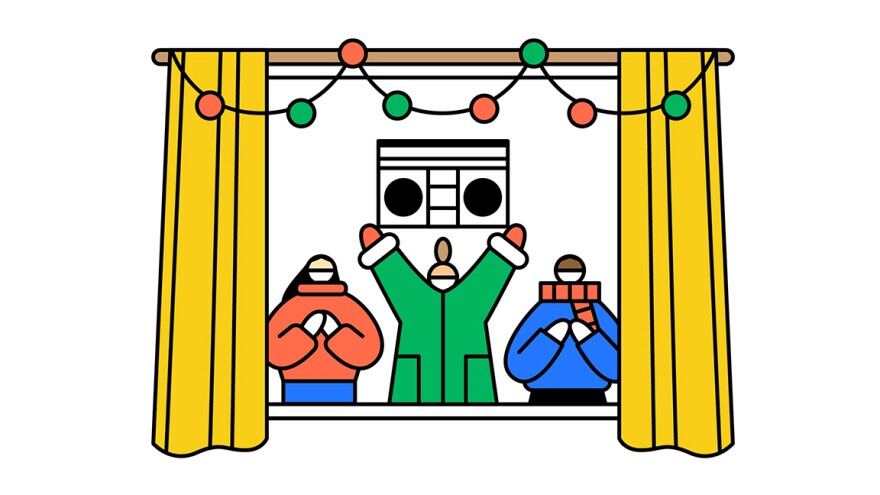
Singing in large groups has a high risk of viral transmission, especially when singers are unmasked, says Guzman-Cottrill. "However, I think a household could safely go caroling in their neighborhood if the family stays together and strolls through the neighborhood sticking to the sidewalks, walkways and driveways."
The Covid Carolers of Nashville First Baptist Church say they follow CDC guidelines when they go Christmas caroling. They stand outside and serenade residents of nursing homes and assisted living facilities who come to listen from windows and balconies. The singers wear masks, generally even when singing, and stand a double-arm distance apart from each other.
While singing is an activity that has been shown to increase airborne particles, doing it outdoors "reduces risk of transmission significantly," as does keeping face masks on, says Dr. Abraar Karan, a physician and public health researcher at Harvard Medical School.
But for a safer alternative for Christmas caroling, get inspired by Unsilent Night, a musical experience created by composer Phil Kline.
Participants bring boom boxes or phones and march in the streets for 45 minutes, playing in synchrony (and cacophony) a recording of Kline's ambient compositions, including bells, harps and chants that evoke Christmas music. While the tradition has been around since 1992, organizers of different Unsilent Night events around the world this year are capping attendance to the maximum number allowed by local regulations. New York City, the largest Unsilent Night, has been canceled to discourage large in-person gatherings.
Instead, organizers are encouraging people to plan their own intimate Unsilent Nights within their own circles, or to stand with a lone boom box in the front yard, à la John Cusack in the 1989 film Say Anything.
5. Religious celebrations
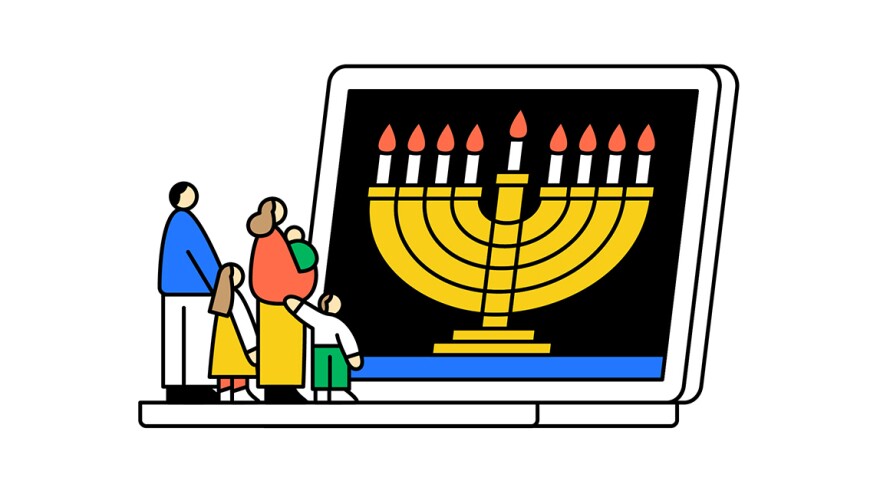
Rules vary state to state, but "there are limits in many of the churches and in other religious gatherings as well," Malani notes. Some states don't require mask-wearing or physical distancing, so that's something to be aware of. Wherever you live, try to find safer ways to worship this year.
"I have friends, where one member of the family goes [to church] and brings communion back for the others, and the others join virtually," she says. Some worshipers have been attending religious services and classes outdoors or virtually for months, and some Catholic churches even offer "drive through" confession. In many ways, Malani says, these adaptations mean access to many religious practices has actually improved this year for a lot of people with an illness or disability who, prior to the pandemic, were unable to participate in in-person activities.
As for Christmas Eve's popular midnight Mass, which is often held wall-to-wall with congregants — "that just can't happen," this year, Malani says. But there are alternatives: Many religious leaders and organizations will be streaming a service that's been modified for safety — including the Pope, with his midnight mass from the Vatican.
This year, Carnethon says she's not going to in-person services. "I'll be watching on TV." Her church has "high-quality streaming at the kids' school and we project it on the TV." She's become very comfortable with this alternative, she says. "It's very convenient to watch church while drinking coffee on my couch."
6. Cookie exchanges
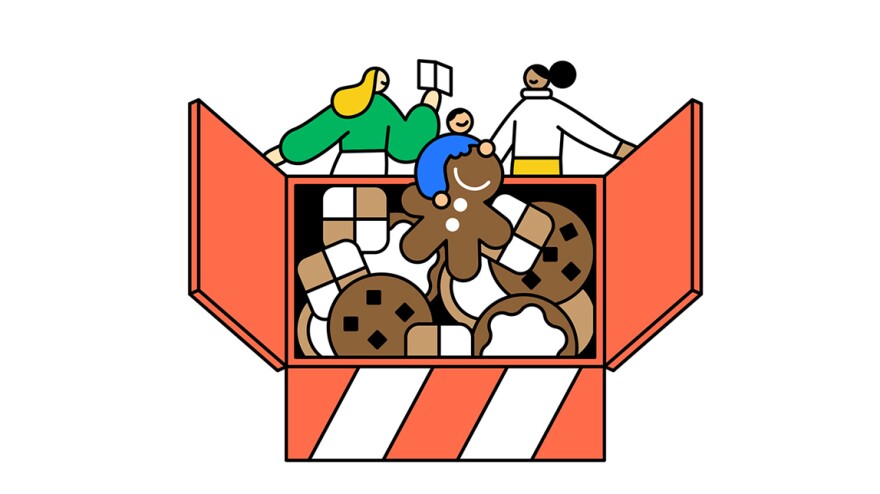
In-person gatherings to make cookies with pals just aren't safe this year; ovens are inside, and it's hard to maintain physical distance in the kitchen. But fun exchanges of baked goods can still work. Cookies can be quite safely baked at home, then packaged and dropped off at a friend or family's doorstep.
A group of neighbors in Merriam, Kan., have been exchanging cookies this way since early in the pandemic. It started when Jennifer Silvers' neighbor sent her a text informing her that she had cookies at her front door. Silvers, who also had baked cookies the night before, immediately followed suit with another neighbor, and soon five others who live nearby were involved.
These days, the neighbors periodically leave baked treats at each other's doors, inside Tupperware and decorated brown paper bags. They never know when sweets will show up at their own homes, and Silvers says that spontaneity makes it even more fun.
"I actually prefer the COVID cookie exchange because I feel like it's more of a mystery and surprise and it's always nice to get something other than junk mail delivered to you home," she says
Another option Malani suggests is to exchange recipes.. "Maybe this is the year that you write down Grandma's cookie recipe or record a video of her doing it, so that you have it for future generations." Or exchange your favorite family recipes with dear friends in other households. And don't forget that making favorite cookies with the kids of your own household creates a cherished memory for all involved — another holiday gift.
For all sorts of health reasons, Khan says, remember to frequently wash your hands.
7. Light shows
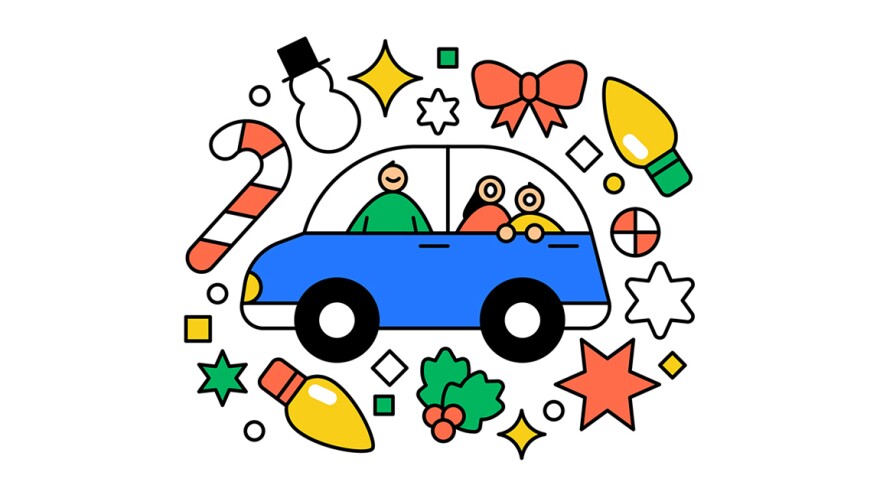
Holiday lights bring cheer to any dark season and there's no reason to miss out this year. Many zoos, parks and neighborhoods put on elaborate holiday light displays.Taking a drive is a wonderful and safe way to view decorations, says Malani. Jernigan-Noesi notes that as a special bonus this year many venues have lengthened their festival of lights. "In some areas," she says, "you can even tune to a radio station and hear holiday music playing as you're driving through and looking at the lights."
A car isn't necessary for enjoying holiday light displays. It's also fine to take a walking tour around your neighborhood, Malani says, "as long as you wear a mask, keep distance — and make sure you wear warm clothes if it's cold out."
8. Holiday shows and other fun for kids
Lovely as traditional holiday performances of The Nutcracker are in many cities and towns, this year will be different. The transmission risk is just too high to go in-person. "I do not recommend indoor theater shows or performances," says Guzman-Cottrill, because there are just too many variables, even if you're conscientious. "What if the stranger seated next to you is coughing or removes their mask during the performance?" Just not worth it, she says.
The good news is there are more terrific televised and online performances to choose from this year than ever before. Last year's performance of The Nutcracker from the New York City Ballet, for example, can be streamed on MarqueeTV. Other ballet companies, such as the Oregon Ballet Theatre, are offering pre-ordered holiday-themed concessions and Nutcracker-themed gifts. And Milwaukee Ballet is offering a behind-the-scenes documentary for serious fans of the Tchaikovsky-scored ballet.
Though classroom and neighborhood parties for the little ones just aren't a safe option this year, creative alternatives abound.
Pop-up drive-ins have appeared in some cities and towns, showing holiday movies. On Carnethon's block this year, neighbors have organized a holiday scavenger hunt for kids that will task the youngest with looking for certain decorations — maybe two elves or two reindeer or specific colored holiday lights. Older children, meanwhile, will be asked to take a picture to prove they've found the items, and the neighborhood's adults have arranged small prizes for all.
To connect with far-flung family and friends, old-fashioned games like charades, or trivia questions can be fun for all ages, and inject extra life into video-chats.
In the end, Jernigan-Noesi says, it's really about making the effort to make this year's holiday extra special — think stringing popcorn and cranberries as a household activity, or making paper snowflakes for your windows or other easy handmade crafts or ornaments. Whether it's for Kwanzaa, Hanukkah, Christmas or the winter solstice, just interrupting your routine and doing crafts together as a family can be special and memorable.
9. Ice skating, sledding and snow play
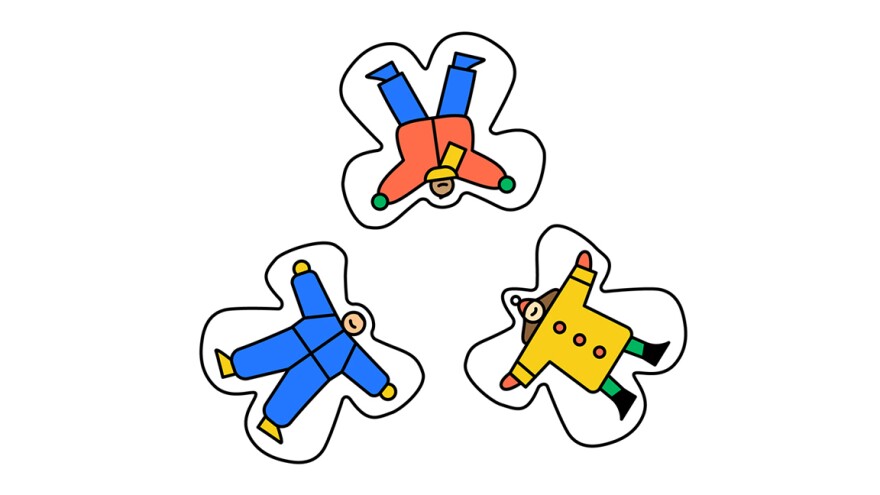
Good news! Any of these activities that take place outside can be done safely. Guzman-Cottrill says she always encourages outdoor activities because the risk of viral transmission is lower with fresh air circulating.
"It's also very important to encourage exercise," she says. "Ice skating, playing in the snow and running up sled hills are all great cardiovascular activities, which are important for our mental health as well." Just keep that mask over your nose and mouth at all times (unless you're solely with household members), she says. "Masks will help decrease viral transmission and can also help keep our faces warm!"
And whether skating, sledding or building a snow family, avoid congested venues at peak times, and maintain a safe space between yourself and others.
Copyright 2023 NPR. To see more, visit https://www.npr.org.



